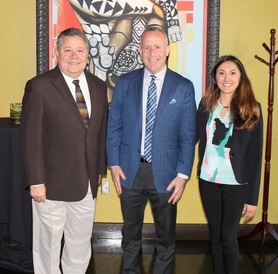Darrell Steinberg, former California Senator President pro Tempore, is running for Mayor of Sacramento. Latino Journal got the scoop on his goals and how they will impact the capitol city's Hispanic community.
 Jose Perez, Darrell Steinberg, Isela Perez
Jose Perez, Darrell Steinberg, Isela Perez LJ: You’ve been to the top of the legislative ladder in California. Why do you want to run for Mayor of Sacramento?
DS: Who wouldn’t want to be mayor at this time in its history? It is emerging as the next great American city. Economically, it is beginning to redefine itself. We’ve always been a government town and rightfully so, but I certainly believe strongly that it's no longer enough. We are in a position to attract and retain high-wage industries to this city, expand our economic base and take advantage of our location and our natural resources to be much more a tourist and convention-center destination. The arena was evidence of what is possible. But, if it is the end of the story as opposed to the beginning of the story, we haven’t done nearly enough. Whether it's the rail yards, or the fact that we’re at the confluence of two rivers that are completely underdeveloped, or the riverfront as a destination, there's a lot more work to do. Some of the historic corridors of the city like Broadway, Southside, South Sacramento, and Del Paso Heights as well. We have to continue to expand our identity, especially given that we have a competitive advantage, cost-wise with the bay area. We need to be very aggressive about getting our share of tech. We’re not in the top 50 when it comes to convention business in this country and yet, we’re in the heart of Northern California. Initiatives like Farm to Fork are a wonderful start, and a wonderful brand, but it’s not nearly enough. What about expanding our relationship with UC Davis and using Sacramento as the center of incubation and entrepreneurship around food, nutrition and agriculture? I’m thrilled to be running for Mayor of Sacramento at a time when there are such possibilities, and of course there are great challenges, too. I thought a lot about it. My reach with state and national leaders and having authored a lot of the laws that the city can take advantage of to draw down resources and benefit and achieve the accomplishments. I think the city deserves great leadership. Gov. Brown said to me, when I asked him about my career and pathway, "You know? My second-favorite job, second to being governor, was being Mayor of Oakland." You get to take all you’ve done, all you’ve learned, all you know, and you get to build something in a way that you can see and you can feel. I invested the majority of my adult life in public service for the city of Sacramento and it has invested a lot in me. I still have more to give it.
LJ: Latinos are almost 30 percent of the population in Sacramento, how do you see Latino community playing a role in your stewardship of the city and its development?
DS: In a major way. I’m very proud to have the endorsements and support of Phil Serna and Eric Guerra, it’s really important through the emerging leadership, the current leadership, not just of the Latino community, but of the larger community. I think about how far we have come; Jose Serna and Debra Ortiz were groundbreakers and now it is rightfully expected that, given the change in demographics, Latino leadership is community leadership. I think my obligation is to make sure that when it comes to boards and commissions, when it comes to civic responsibilities that we reflect the diversity of the community. During my years in the legislature, I really saw and worked with the demographic change in California. I was proud to support Kevin de Leon as my successor. My voting record, which is very clear in terms of immigration, driver’s licenses, the DREAM act, or trying to deal with what the federal government hasn’t done has been consistent. I also was a leader. When it came to the moment regarding the driver’s license bill, despite the controversy and consternation in the house, I green-lighted and said ‘we’re doing this’. I have longstanding, warm and positive relationships with Latino leadership and the Latino community.
LJ: In terms of Sacramento’s developing sports platform, do you see by way of leadership to continue the effort to make the Sacramento Republic an MLS franchise?
DS: Yes, we need to be a Major League Soccer city. Soccer has become the emerging sport, especially among the millennial generation. I think it's reflective that the millennial generation is at the forefront of youth soccer leagues. When I was a younger person, soccer wasn’t really the main sport for younger people. But now, it is. So MLS in Sacramento would be an incredible opportunity, not just because soccer is growing in popularity in our community and our region, but it’s a great opportunity to redevelop the rail yard. So, I’m all in. Hopefully it’ll get done by elections, but if not, I’ll be poised to do everything we can to make sure we succeed.
LJ: What's to stop downtown Sacramento from becoming a bustling, metropolitan area that pushes out small businesses and become a corporate city?
DS: We've got to make sure it doesn't happen. We've got to be conscious. We just need to make sure there is room for that which can arise quickly, like the Art Hotel. We need to build a civic culture that has something for everyone, like a vibrant arts community. We are just at the front end of achieving that. Why aren't we engaging our local artists at Regional Transit stations? Whether it's live performance rotations or music, we just have to be a little creative here. It doesn't require of years of planning and permitting.
LJ: Education is a major issue with the Latino community. What are your plans for Sacramento's education pathways?
DS: Joe Serna was a dear friend and a mentor to me. He said something that was true in 1992 that is still equally true today, "A great city has to have great schools." While we've made advances and there are pockets of excellence, about 2/3 of Sacramento City College graduates who go to Sacramento State have to take remedial courses in either English, Math, or both. That says to me that if we're going to generate a highly educated, highly trained workforce for our emerging economy, we need to care about the schools. I will be an education mayor. I have some very specific ideas; the work I did to create to what will amount to over $1 billion in funding to bring back what I call the modern definition of vocational education. We need to redesign high schools so that young people, 16 and 17-year-olds have paid internships in Sacramento industries, so their curriculum is integrated with their career interest. This is essential. It's not something we can leave to others. A mayor needs to rally the school board members, the education professionals, the civic leaders to put together these pathways. I want to create the tightest of tight connections between local businesses, high schools and colleges.


 RSS Feed
RSS Feed